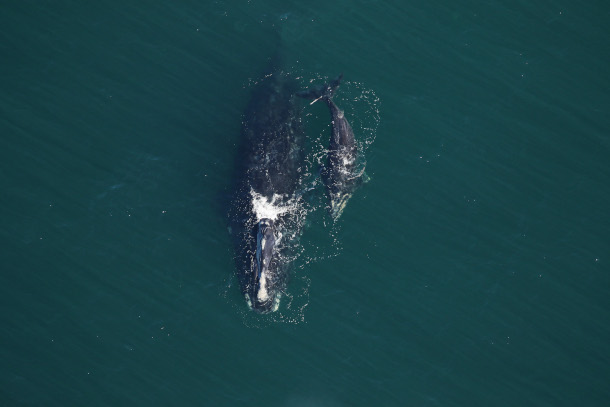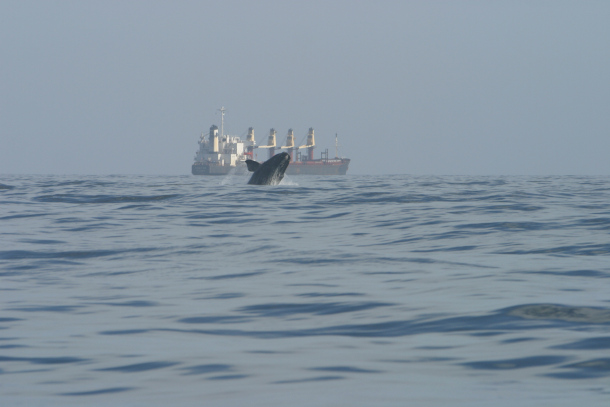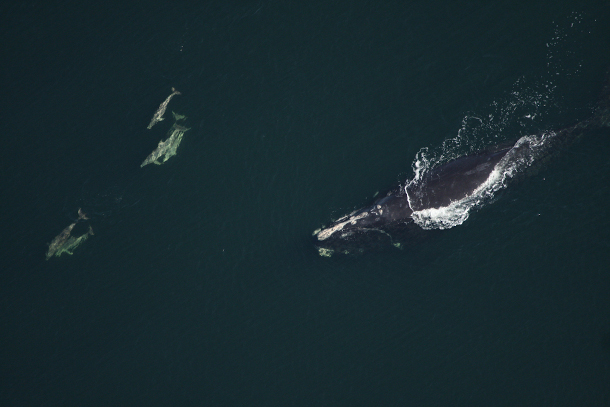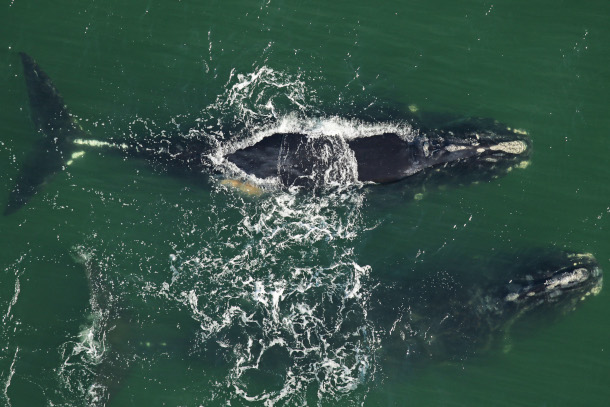Little Time Left to Save Right Whales
Air Date: Week of January 22, 2021

There are less than 400 Northern Atlantic Right whales left and no more than 100 breeding females. (Photo: Clearwater Marine Aquarium Research Institute, FWC Fish and Wildlife research Institute, Flickr, CC by NC ND 2.0)
The North Atlantic right whale is one of the world's most endangered species, and ship strikes and entanglement in fishing nets threaten its survival. After years of petitioning the National Marine Fisheries Service to little avail, environmental organizations have filed a lawsuit to compel the agency to expand protections for the whales. Kristen Monsell, senior attorney for the Center for Biological Diversity, spoke with Host Bobby Bascomb about what’s needed to save the species.
Transcript
BASCOMB: Conservation groups recently filed an emergency rule-making petition asking the US government to expand protections for North Atlantic Right whales. Once hunted to near extinction, right whales supposedly came by their name because they were the right whale to hunt. They move slowly through the water and tend to float once killed instead of sink like most whales, making them easy to retrieve for their blubber and meat. Once hunting was banned in 1935 the population of right whales began to slowly bounce back, but today the population is again in free fall. Ship strikes and entanglement in fishing gear are killing more right whales each year than are being born. Less than 400 of these giant marine mammals remain, making them a critically endangered species. For more I’m joined now by Kristen Monsell, a senior attorney for the Center for Biological Diversity, one of the groups petitioning the National Marine Fisheries Service for added protections for right whales. Welcome to Living on Earth Kristen!
MONSELL: Thank you happy to be here.
BASCOMB: The Center for Biological Diversity along with other conservation groups has filed a lawsuit against the government asking for the protection of Northern Atlantic right whales. What actions are you arguing for in this lawsuit and how will it actually help the species?

These Atlantic coastal waters are part of a network of Seasonal Management Areas (SMA) implemented by NOAA Fisheries to reduce the likelihood of deaths and serious injuries to these endangered whales that result from collisions with ships. (Photo: Florida Fish and Wildlife Conservation Commission, NOAA Research, FWC Fish and Wildlife Research Institute, Flickr, CC BY-NC-ND 2.0)
MONSELL: One lawsuit is about vessel strikes. So vessel collisions can kill or injure right whales in a few different ways. One through blunt force trauma that can result in fractures or blood clots or hemorrhages. Another is through direct propeller strikes that can result in blood loss, lacerations or amputations. But science tells us that when ships slow down to 10 knots or less, they are much less likely to kill a right whale. And the agency has a rule in place right now that requires vessels over 65 feet in length to slow down in certain areas at certain times of year to prevent right whales from getting run over and killed by ships. And we petitioned the agency in 2012, to expand the scope of that rule so that it applies in more areas, and that it applies to smaller vessels, because there is situations in which right whales were struck by much smaller vessels. And the agency has never responded to our petition despite a host of evidence indicating that the rule, while it's effective in the places and times that it applies it's not effective enough, it needs to be expanded both in time and space and to the vessels that it applies to.
BASCOMB: And how difficult of a sell is this for the fishing industry or the commercial shipping industry that travels in this area? How would reducing speed limits impact the boats that are going through there?

This right whale was photographed with a small pod of bottlenose dolphins, common in nearshore Florida waters. (Photo: Florida Fish and Wildlife Conservation Commission, NOAA Research, FWC Fish and Wildlife Research Institute, Flickr, CC BY-NC-ND 2.0)
MONSELL: The shipping industry didn't like the rule when it was originally enacted in part because they claim it would result in a significant economic burden on the industry. But we know since reports that have been issued since the rule went into effect to that the impact was much less significant than they had claimed it would be. There's also an exemption in the rule in the interest of safety if the captain of the boat thinks that it would endanger his or her crew to slow down in a particular area because of ocean conditions or other factors. They don't have to slow down. And, you know, frankly, I think we can't afford not to enact these protections because if we don't we really risk losing the species forever and whales provide incredible benefits to the ocean and our planet as a whole. For example, their poop is incredibly nutrient rich, it helps to fertilize phytoplankton, which are the base of the food chain and the whales really do sow the seeds of healthy ecosystems. And in addition, they also act as carbon sinks. whales accumulate lots of carbon in their bodies during their lives and when they die, they sink to the bottom of the ocean taking all that carbon with them. So we really risk significant disruption to the ocean ecosystem if we we don't save these species.
BASCOMB: So ship strikes are the obvious and acute problem for right whales right now that you're trying to address. But of course, there are a lot of problems in the world's oceans. Can you tell me please about some of the other challenges facing right whales and how this potential change in boating speed would factor into the bigger problems facing their habitat as a whole?
MORGAN: Right whales are unfortunately facing a slew of problems including entanglement in fishing gear. And that's another issue that we are trying to tackle through a variety of means including both the courts and administrative petitions to the National Marine Fisheries Service. And like ship strikes, there are very common sense measures that the agency can take to help protect these animals from getting tangled up and seriously injured or killed in commercial fishing gear, including closing important right whale habitat areas, to vertical lines and promoting the transition to rope less fishing gear, which is a type of gear that has no static vertical line running through the water column only during active retrieval would there be any vertical line so you essentially eliminate the risk of entanglement by eliminating the rope in the water. Which is something that we're, we're pushing for.

Two potential calving females. The top whale in this photo has a large propeller scar on her right side from a vessel strike. Although she survived this vessel strike, the scar may become problematic during pregnancy as her body expands to accommodate the growing calf. (Photo: FWC Fish and Wildlife, FWC Fish and Wildlife Research Institute, Flickr, CC BY-NC-ND 2.0)
BASCOMB: And how is climate change affecting the whales? I mean, that's a much bigger problem, obviously.
MONSELL: Yes, it is. A lot of the problems right whales are facing now are in part due to climate change and warming waters that are shifting where their prey is. So, we're seeing right whales go into habitat areas where they haven't traditionally been found. So, there are no protections in place in those particular waters, which is increasing their rate of entanglement. And one of the effects of that has been that there are now significantly longer calving intervals. So, the time period between when you know one whale gives birth to a baby right whale and then does it a second time. A healthy right whale will have a calving interval of about three years now that calving interval is up to about ten years, which is another reason why this species is doing so poorly.
BASCOMB: Gosh, so many challenges for them. It's, it seems really overwhelming and daunting, I should think.
MONSELL: It is but you know, these whales are resilient. They came back from the brink of extinction once we stopped hunting them. And they can do that again provided we stopped running them over with ships and entangling them in fishing gear.
BASCOMB: Well, right now, what are the long-term survival projections for right whales?
MONSELL: Sadly, it's not looking good right now. Scientists estimate that if current trends continue the species could be functionally extinct within the next 20 years. While the situation is really dire right now, we can save these animals. We know what needs to be done. We just need the political will to do so and are very hopeful that with the Biden administration coming in the tide will start turning for right whales and we'll see the population increase again rather than the significant unsustainable decline we're seeing right now.
BASCOMB: Kristen Monsell is a senior attorney with the Center for Biological Diversity. Kristen, thank you so much for taking this time with me today.
MONSELL: Sure, no problem.
Links
NRDC | “What’s Happening to the North Atlantic Right Whale Is Just Plain Wrong”
Daily Hampshire Gazette | “Lawsuit Seeks More Protection for Right Whales”
Living on Earth wants to hear from you!
Living on Earth
62 Calef Highway, Suite 212
Lee, NH 03861
Telephone: 617-287-4121
E-mail: comments@loe.org
Newsletter [Click here]
Donate to Living on Earth!
Living on Earth is an independent media program and relies entirely on contributions from listeners and institutions supporting public service. Please donate now to preserve an independent environmental voice.
NewsletterLiving on Earth offers a weekly delivery of the show's rundown to your mailbox. Sign up for our newsletter today!
 Sailors For The Sea: Be the change you want to sea.
Sailors For The Sea: Be the change you want to sea.
 The Grantham Foundation for the Protection of the Environment: Committed to protecting and improving the health of the global environment.
The Grantham Foundation for the Protection of the Environment: Committed to protecting and improving the health of the global environment.
 Contribute to Living on Earth and receive, as our gift to you, an archival print of one of Mark Seth Lender's extraordinary wildlife photographs. Follow the link to see Mark's current collection of photographs.
Contribute to Living on Earth and receive, as our gift to you, an archival print of one of Mark Seth Lender's extraordinary wildlife photographs. Follow the link to see Mark's current collection of photographs.
 Buy a signed copy of Mark Seth Lender's book Smeagull the Seagull & support Living on Earth
Buy a signed copy of Mark Seth Lender's book Smeagull the Seagull & support Living on Earth

